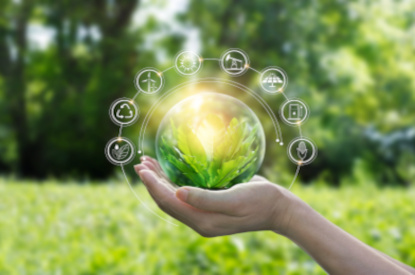Level 1 Award in Environmental Sustainability
Increase your knowledge of sustainability principles, environmental impacts and your role in helping to make sustainable choices.

Level 1 Award in Environmental Sustainability
£90.00
+VAT
- Earn discounts
- Receive reminders
- Keep training records
- Track progress

Subtitles: English
PayPal Buyer protection
Ascentis Awarding Body
Mobile device friendly content
Duration: 10 (GLH)
Retakes: Re-sit fees apply
Overview
Our Level 1 Award in Environmental Sustainability qualification will increase your understanding and awareness of what environmental sustainability is and the impacts humans are having on the environment. You'll gain knowledge of natural resources, including renewable and non-renewable sources, the impacts of waste, energy, water usage and transport amongst other effects, how these impacts might be reduced, and the benefits of sustainable communities. Upon successful completion of the invigilated assessment, you will receive an official certificate.
The course provides an introduction to environmental sustainability and includes:
- Narrated video-lessons with English subtitles available
- Activities and progress quizzes
- A mock practice test, complete with review facility and a bank of changing questions.
You will need to pass a multiple-choice exam at the end of the course in order to gain the official qualification. This exam can be taken on a laptop with a camera in a suitably quiet location. Your activity on the screen and via the webcam is recorded during the whole assessment and reviewed by the examining body. Upon passing the exam, you will receive an official certificate.
Course Syllabus
-
Course Introduction
This unit provides an introduction to the Level 1 Award in Environmental Sustainability course. It outlines the structure of the course and how the rest of the modules and units cover the course content.
-
Understanding Environmental Sustainability
To get the course underway, we start by examining different definitions and viewpoints of environmental sustainability. We then move on to look at the idea of sustainable development and how prosperity underpins this.
-
Sustainability Models
This section looks at different sustainability models as well as the three strands of sustainable development.
-
Excess Consumption and the Problems Caused
Next, we explore the concept of excess consumption and highlight the problems it can cause. In addition, we'll also take a look at how to measure environmental sustainability through concepts such as ecological footprint, carbon footprint and biocapacity.
-
The Ways that Individuals Impact the Environment
To round off our first module, we home in on ways that individuals impact the environment and how you as an individual can make significant changes that will have a positive impact on the environment. This unit also explains how the end-of-module progress tests work.
-
The Importance of Natural Resources
To kick off our second module, we examine different natural resources, their uses, and how to categorise natural resources.
-
Resource Categorisation by Availability
Continuing our exploration of natural resources, this section focuses on the different types of renewable and non-renewable resources.
-
Sustainability Issues Related to Natural Resources Part 1
Now we'll turn our attention to the sustainability issues related to natural resources. In this first part, we'll focus on issues surrounding sustainable water and soil use.
-
Sustainability Issues Related to Natural Resources Part 2
For part 2 of the sustainability issues related to natural resources, we'll look at the problems of overfishing and deforestation, as well as air pollution and the importance of carbon sinks.
-
Sustainability Issues Related to Natural Resources Part 3
For the final unit of module 2, we consider different renewable and non-renewable energy sources, and their effects on climate change. In addition, we explore the United Nations' 17 Sustainable Development Goals. We then round off the unit with a case study.
-
How Goods and Services are Created
To get our third module underway, we begin by describing how resources are adapted to create goods and services, which then make their way through the supply chain. We additionally explain the importance of moving from a linear economy to a circular economy.
-
Environmental Impacts of Waste and How they might be Reduced Part 1
Now we'll begin to take a deeper dive on each of the global environmental impacts, starting with waste. Here, we look at how waste is managed, the concept of the waste hierarchy, and different methods of waste disposal. We'll also introduce you to life cycle thinking.
-
Environmental Impacts of Waste and How they might be Reduced Part 2
Continuing with our focus on waste, this section examines food waste, and plastic pollution and recycling. We then outline the UN's targets for responsible production and consumption, and describe ways that you as an individual can reduce the impact of waste.
-
Environmental Impacts of Energy Use and How they might be Reduced Part 1
Our next environmental impact focuses on energy use as we explore the world's energy problem, energy poverty, and different sources of energy, such as hydropower, wind power, and solar power.
-
Environmental Impacts of Energy Use and How they might be Reduced Part 2
Sticking with the topic of energy use, we're going to look at some more energy sources, such as geothermal energy, biomass, and nuclear. We'll then conclude the unit by examining the UN's targets regarding energy and climate action, as well as ways that you as an individual can reduce the impact of energy use.
-
Environmental Impacts of Water Use and How they might be Reduced Part 1
Moving onto water use now, we'll explain water security and its link to climate change, and examine the different uses of water in agriculture, industry and households.
-
Environmental Impacts of Water Use and How they might be Reduced Part 2
To complete our view on the environmental impacts of water use, this section looks at unsafe water and the problems of pollution. We then consider UN targets for clean water and sanitation, as well as how you as an individual can reduce the impact of your own water usage.
-
Environmental Impacts of Transport and How they might be Reduced
For our final unit of module 3, we look at the transport sector's environmental impacts, from the link between transport usage and carbon dioxide emissions, to carbon zero transport. We then conclude the module with another case study.
-
Sustainable Communites
For our final module of content, we shift our focus to sustainable communities and outline the principles of a sustainable society. We'll also introduce you to different types of sustainable communities and explain the United Nations' Sustainable Cities indicators and targets.
-
Local and Global Benefits of Sustainable Communities
In the last unit of module 4, we look at the benefits of sustainable communities from both a local perspective, such as community living and sustainable urban planning, and a global point of view, such as green infrastructure, sustainable construction, and green rainwater management. We'll then round off the unit with a final case study.
-
Revision 1
In this first unit of revision, we'll be revisiting key information from the first module that you will need to know for your exam. In particular, we will use different activities to revise the three strands of sustainable development, excess consumption and the problems it can cause, and ways that individuals impact the environment.
-
Revision 2
Next, we'll revise natural resources.
-
Revision 3
This unit recaps how goods and services are created from natural resources, and the impacts of waste, energy, water usage and transport. It also revises how each of these might be reduced.
-
Revision 4
Our penultimate revision unit revisits the concept of a sustainable community, and its local and global benefits.
-
Preparation for your Exam
This unit outlines the equipment you will need to take your exam online, what happens when you send us your exam booking form, the process for setting up your devices in preparation for your exam, and some handy exam tips.
Obtaining your certificate
You will need to pass a multiple-choice exam after you have completed the course in order to gain the official qualification. But don’t worry – we will ensure that you are well prepared with our revision module and mock exam.
Popular Courses

Overview
This course combines The Digital College courses "Level One Award in Health and Safety in a Construction Environment" and "Preparation for the CITB health, safety and environment test" to enable you to attain a CSCS "Green Card" as quickly as possible. Nothing extra to pay; all training and exam costs included! You just pay for the card.

Overview
This is the official qualification required by local councils for anyone in England and Wales applying for a Personal Licence to serve or sell alcoholic drinks. This delivers the complete training package of online study, practice questions, an invigilated assessment and an official certificate to those that pass this qualification. The certificate can then be supplied to your local council as part of your Personal Licence application.

Overview
This bundle contains everything you need to gain a Personal Licence to authorise the sale of alcoholic drinks in England and Wales. This delivers the complete training package of online study, practice questions, an invigilated assessment and an official certificate to those that pass this qualification. We will then obtain a DBS certificate and apply to your local council on your behalf - saving you a lot of time and effort.

Overview
This Level 1 Award Health and Safety course and test, awarded by Highfield Qualifications, is aimed at learners who currently work, or want to work, in construction. Successful completion will enable you to move on to take the CITB health, safety and environment test, and then apply for the new Construction Skills Certificate Scheme (CSCS) Green Card. This card allows access to construction sites in the UK as a non-skilled worker and is designed to improved overall site safety.

Overview
Our Level 2 Award An Introduction to First Aid for Mental Health qualification will increase your awareness of common mental health issues, such as anxiety, depression and stress, that can have an impact on our everyday lives. You'll also obtain knowledge on how a mental health first aider can provide immediate "on the spot" care to others, while looking after their own mental wellbeing. Upon successful completion of the invigilated assessments, you will receive an official certificate. This qualification incorporates the Level 1 Award An Introduction to Mental Health and Wellbeing qualification.

Overview
Our Level 2 Food Hygiene certificate course covers food hygiene, food hazards, food poisoning, how food becomes unsafe, personal hygiene, awareness of contamination, time and temperature factors, proper cleaning and sanitising, premises and equipment and food handling responsibilities. This is perfect for anyone preparing or handling food.
Level 1 Award in Environmental Sustainability
Increase your knowledge of sustainability principles, environmental impacts and your role in helping to make sustainable choices.£90.00
+VAT







